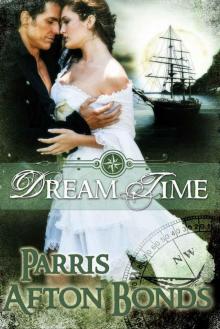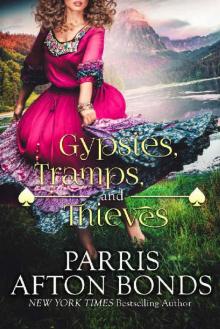- Home
- Parris Afton Bonds
The Maidenhead
The Maidenhead Read online
T H E MAIDENHEAD
PARRIS AFTON BONDS
Published by Paradise Publishing
Copyright 2012 by Parris Afton, Inc.
All Rights Reserved
Cover artwork by DigitalDonna.com
This is a work of fiction and a product of the author’s imagination. No part of this novel may be used or reproduced in any manner whatsoever without written permission except in the case of brief quotations embodied in critical articles and reviews. This e-book may not be resold or given away. The Maidenhead is a revised edition formerly published under the title of The Savage. Any resemblance to characters living or dead is purely coincidental.
BONUS
First chapter of my novel LAVENDER BLUE is at the end of THE MAIDENHEAD.
Chapter One
The Virginia Company of London seeks one hundred willing maids for marriage to bachelor planters of James Cittie Colony. Maids must be young, handsome, and honestly educated.
Gingerly, Modesty nudged aside the still-wet blue snuffbox she'd painted so that she could better view the advertisement beneath it. After hours of tedious work, her eyes ached. They were her bane. Needed glasses, she did. And a pair of eyes the same color would be faerie dust. One green and one brown was an occasional cause for consternation.
Her stepfather had been ought to say, "Tis a sure sign of the devil." And her cleft chin a sign of lewdness.
Little wonder her mother died early. If the plague hadn't killed her, her husband’s sanctimonious carping would have.
Modesty leaned closer to the broadside. Her nose, which she considered too large for her face, was a thimble's length from the print. Her finger, its nail crusted with blue paint, followed the words. Posted notices for available sailor berths shared space with names of ships in port and a list of merchants’ goods that included Moorish slaves and Oriental spices.
Paint fumes blurred her vision, and she pushed away the jar of cobalt blue. She squinted at the broadside’s date. March 9, 1620. The announcement was only three days old.
She read further. James Cittie was described as a "thriving towne amidst faire meddowes and goodly tall trees.”
The broadside stated that the Virginia Company of London had elected to invest in the importation of the females for the purpose of selling them off to the enormous number of bachelors who could afford to buy a wife.
She made a sound that was half snort and half chuckle. "Young, handsome, and honestly educated," she mused.
Well, at twenty-six, she wasn’t young.
If an hourglass figure and fair features were prerequisites for being considered handsome, then she didn’t qualify in that category either.
Her nocturnal activities would certainly discredit her claim to honesty.
That left the attribute of "educated." Aha. Now that was a quality to which her stepfather could attest, bless his shriveled soul.
Thomas Fanshaw had been a harsh taskmaster. Her fingers and her shoulders had smarted enough under his razor strap when her penmanship went awry or her scribbled sum was not the correct total. Thanks to his pious and exacting nature, she could recite the books of the Bible and quote its scripture. He had been a chorister in the Canterbury cathedral, a fact that hardly determined her life path. Or just mayhap it did.
When Thomas Fanshaw had allowed the village vicar, an Anglican with a strong puritan bent, to order an awl driven through the tongue of her brother Robby for swearing, she forsook both society’s God and its religion.
She sighed. To dwell with regret on the past was foolish. The hour was late, nearly four in the morning. At this rate, she would get less than four hours sleep before she exchanged her painter’s smock for an alehouse maid’s apron.
She picked up the paintbrush, dipped it in the jar, and went back to work on her latest masterpiece: transforming Lord Pemberton’s black snuffbox, embossed with his gold seal, into a blue one festooned with a fairy ring.
With a goodly measure of pride, Modesty considered herself one of the best of London’s craftsmen in the art of camouflaging or altering watches, seals, rings, and other valuable stolen items.
* * *
Located between Fleet Street and the Thames, Modesty’s run-down neighborhood, the Bridewell Dock area, with its narrow courts and alleyways, was the haunt of all manner of thieves, strumpets, and cutthroats who disposed of their victims’ bodies in the stinking River Fleet at night. Every day Modesty saw these lowlifes pass through the Bridewell Dock Grog Shop’s battered door. Even at this time of morning, nearing the tenth hour, the alehouse—the remains of a portion of an old Saxon castle—reeked of cheap drink, stale vomit, and piss.
Few heads turned when Modesty spotted the rakishly dressed Handsome Jack Holloway stroll in. Most of the alehouse occupants, as well as Modesty, knew Jack for what he was— a skilled pickpocket and a fencer of stolen goods.
In spite of rewards offered for information of his whereabouts, Jack swaggered around in flamboyant finery. Wearing a ruffled white silk shirt, red velvet suit, silver-hilted sword, diamond rings on every finger, and a gold watch dangling from his waistcoat, he cut a dashing figure.
Through the white haze of pipe smoke, his bright blue eyes found Modesty. She set the tin cup of ale before one sour-faced patron and waited for Jack to wend his way to her through the maze of God’s neglected souls.
Jack employed a team of artists to alter stolen valuables and owned several warehouses for the storage of these goods. She sincerely liked her nocturnal employer. He might cheat, steal, and lie, but he was the gentlest of souls. Wouldn’t harm a cockroach. She was lucky to work for him.
Yes, between the alehouse and her artistry, she was most fortunate. She had a roof over her head and food in her belly. Security was hers.
Jack wasn’t smiling, and she suspected her news wouldn’t cheer him any. He might find her repartee entertaining, but she sensed that now was not the time for salty byplay. Bluntly, she told him, “The snuffbox isn’t finished."
"We are." His mouth, as mobile as his hands, was set in grim lines. "We’ve been fingered. I’m just one step ahead of the bailiffs.”
Fear robbed her of her breath. She had no desire to be shackled in leg irons.
Jack grabbed her shoulders and shook her lightly. "Modesty! You’re gawking like a simpleton. We’ve got to do something! Quick!”
She focused on his face, where a roguish mouth warred for dominance with a deceptive angel-innocent gaze. Was it genuine concern that showed this time in those thick-lashed eyes? "I am. I’m getting married."
"My felicitations," he said without missing a beat, which was so like Jack. He was adaptable, a mark of their profession.
Gallant even in the face of calamity, he made a leg, then began to saunter back past the noisy tables of clothed primates. When the alehouse door swung open once more to reveal two burly men, he pivoted in the opposite direction. “Hide me!" he mouthed at her.
“The taproom." She nodded toward the rear of the alehouse. If luck was with him, and it usually was, he might appropriate an empty cask for temporary living quarters.
As Jack beat a retreat for the taproom, Lemuel, the slovenly alehouse keeper, sidled up to her and said, “High Sheriff’s officials from the looks of them."
"No doubt here to monitor yewr ale." The publican was an adept at watering down the ale with lime.
But one of the Crown’s two ruffians was pointing her out to his partner. Casually, she removed her stained apron and tossed it on a counter slick with sludge and littered with flat-sided bottles. "I’m on me way to the Virginia Colony, Lemuel."
He stared at the two, now weaving through the alehouse's patrons toward her. "I’d say ye be on 'oor way to Newgate."
“No time for fond fa
retheewells then.” She sprinted to the taproom, saw that the only available cask was occupied, and sped on toward the back door, which opened onto an alley that was home to rats, vagabonds, and odorous garbage. Negotiating the narrow way speedily could be tricky. Slime, rotten food, and raw sewage threatened to impede her flying feet.
In back of her, she heard shouts for her to halt.
Incarceration in Newgate Prison, where the vice, drunkenness, immorality and filth far exceeded her present circumstances and where prisoners died off like flies from jail fever—well, the images spurred her even faster.
She picked up her skirts, hopped over a derelict drunk, and dodged a chamber pot being emptied from a second-story window. The alley abutted the Fleet Ditch, a tributary of the Thames. Twenty thousand boats, from heavy barges and scuttling river ferries to the towering fortresses of the East Indian Company, blocked her view—and her escape.
With nothing to lose, she jumped into a skiff moored in the ditch. The skiff lurched dangerously. From the skiff, she bounded onto a barge. Then she gathered every ounce of her might to vault to the opposite bank—a span that not even a chimney sweep would attempt. And she made it!
“Ta da!" she called to her two pursuers, waved a grimy hand, and hurried on toward Guildhall.
Opposite the Quarter Moon Groggery and a row of shops, Guildhall was thronged with the unemployed who were often subject to imprisonment.
After a few questions, she found the room designated as the Board of Trade and Plantations. "I am here to apply for the position of bride, as advertised by the Virginia Company of London," she breathlessly told the magistrate, who stared at her over his bulbous nose.
Her hair had come loose from her pins during her mad dash, and tangled wisps straggled from beneath her dingy white cap to her shoulders. Her red, cheap satinet skirts were splashed with muck. She and the satinet had both seen better days.
“You meet the qualifications?" he inquired, his brows arched in skepticism.
“As God is me witness, yewr lordship.”
She might not be young, handsome, or honest but she was shrewd—and desperate. So the opportunity to marry a planter who lived at the edge of the world was God-sent.
Not that she believed in God, of course.
Chapter Two
Hardly had the God Sent begun its voyage before a storm lashed the Atlantic. With such a name for a vessel on which she was a passenger, Modesty reckoned she should have expected the foul weather. The wind shrieked and the storm was so violent that the vessel tossed helplessly like a piece of driftwood upon the ocean. In the hold, Modesty felt the ship roll over to its gunwales, then rise up only to pitch forward again in a steep dive.
Conditions in the hold deteriorated rapidly. The galley fires remained washed out, and hot meals were out of the question. Cold, dampness, and putrid air pervaded 'tween decks. Water seeped below to add to the misery. The bilge water stagnated, and the stench was indescribable. In addition, the lack of privacy equaled that of the animals on the Ark.
The one hundred maids confined in between decks with Modesty no longer had the strength to brace themselves to meet each roll and pitch of the God Sent. They were crowded into the chill, dark, and bleak spaces to lay out their bedding wherever they could find room. Undernourished and far too seasick even to look at cold food, they lay uncaring in their wet and soiled bedding.
All but Modesty, who was wedged between Rose Crankston and Annie Brewster. They moaned. She hummed. A ditty whose stanza came unbidden to her lips.
"In the sprightly month of May,
When all smells sweet and looks so gay,
There tripp’d along a buxom lass,
With a milk-pail o’er—”
“Me ass!”
Modesty smiled serenely at the tall, gaunt, and big-boned Annie. The recent widow from a remote East Devon village looked a ghastly green. Beneath a dirty and wilted coif, the eighteen-year-old’s hennaed locks were a matted mess. "No, Annie. Not yewr ass. The grass. ‘With a milk-pail o'er the grass.’ "
Despite her discomfort, Annie let out a rumbling, good-natured laugh.
The ship’s bell marked the hour of the watch. Modesty counted six strokes before being interrupted by Rose’s groan.
“Oh, me stomach!"
Hastily, Modesty rolled onto her left side, away from the tiny, swarthy, and plain brunette. Rose was a wool carder from the Middlesex countryside who wanted to better her lot.
As did most of the maids aboard the ship. All but the delicate-featured Clarissa Lockridge. She had a wonderful oval face, remarkable for its harmony of lines. Beneath an embroidered coronet, her hair, the shade of a gold florin, was brushed smoothly back at her nape, where it was gathered into a lovelock that draped over one shoulder. Her bertha was of the finest lace, her gown of blue silk fastened fashionably down the front with silver ribbon bows. All of which told Modesty that the Lady Clarissa could not better her lot by much.
Modesty counted herself lucky that the Company kept no registry of people going to the colony. In fact, she was happy just to be alive, which was doubtlessly more than she could say for Handsome Jack Holloway.
If jail fever didn’t get him first, the gallows would. Last she had heard of him, after his capture at the Bridewell Dock Groggery, he had been slapped in leg irons and handcuffs for trial at Old Bailey.
She considered her present plight. Since running away from home at twelve, after the deaths of her mother and brother, she had managed to survive many a scrape. In London, she had taken lodgings with an old Irish woman, who introduced her to a group of cutpurses and pickpockets, who in turn introduced her to Jack of the short yellow locks.
Many a lass had her head turned by Jack Holloway. But not she. She wanted something more solid, something of more substance than a mere angel. Like shillings and silver candlesticks and soft beds and sumptuous meals. Security, they were.
If the stories were true, that the lonely and homesick men of Jamestown Colony outnumbered the women fifteen to one, then her hodgepodge looks of a too-wide mouth, mismatched eyes, stringent jaw, high-bridged nose, thick brows, and, of course, the cleft chin would be of little consequence.
Having been blown off course, the God Sent took four months to arrive at its destination, and Modesty smelled land before she saw it. A smell of sweet perfume.
Yet her first look at the Virginia shoreline was not very promising: gray skies, rain, heavy breakers pounding the beach. But once the ship reached the wide mouth of the James River, the rain ceased and the water quieted. Everything quieted.
August’s heavy scents lay over the alien land. Despite the faint breeze, perspiration broke out on her face and under her arms, where sweat stains already ringed her gray lutestring dress. She swatted absently at tiny, stinging pests that attacked her exposed flesh. The ship’s crew said these vermin were called muskeetos by the Indians.
The utter isolation of the landscape made her uneasy. Great oaks, junipers, and pines shadowed the shoreline. What savages lurked there? Rumors aboard ship were that more than 12,000 Indians roamed the primeval forests.
Vaguely, she recalled tales of the visit of the Indian princess, Pocahontas, to London four years earlier. Ironically, the poor girl, barely twenty or so, had grown up in an uncivilized state only to die in London of smallpox.
As the ship sailed up the silent and deep tidewater river, Modesty noted that the flat shoreland was bordered by virgin forests. At one point, a slothful river channel meandered into a swamp with bleached skeletons of long-dead trees. A shiver rippled up her spine. What had she gotten herself into?
Occasional clearings that exposed one-room frame cottages with steep thatched roofs were more reassuring. The sight of a two-story, brick- and-timber home indicated a prosperous plantation and gave her and the other maidens hope. Crowded against the main deck and half deck railing, she and her companions speculated about the plantation’s crops, although tobacco seemed to be the general guess and was confirmed and pointed out t
o them by one of the crew. The maidens speculated more so on its owner. Would they be among the fortunate to land one of the wealthier bachelors?
"As long as he isn’t some ignorant lout," Clarissa said, stifling a yawn with a porcelaneous hand. "I would that I had a husband who will not bore me."
If Modesty had to marry, it seemed to her that her best course of action would be to marry an old gent. An old rich gent. One not long for earthly pleasures. One she could manage with a sweet smile, a soothing hand, and soft words. A few months in a pastoral exile, then back to glorious London it would be. By that time and with a little luck, the furor over her would have been long forgotten.
At last, late in the afternoon, the sea-weary vessel rounded a peninsula and a turf fort came into view. By squinting, she could make out the steeple of a church rising reassuringly among the backdrop of trees. Civilization!
Immediately, the maids began primping. With wry amusement, Modesty watched them tuck in errant curls, pinch their pallid cheeks to elicit a becoming flush, and smooth down wrinkled but clean skirts.
Like the other maids, she had been provided with two changes of clothing by the Virginia Company of London when she signed a contract agreeing to marry a colonist. Once the colonist purchased the marriage contract, which paid the Virginia Company’s representative for the cost of a maid’s clothing, food, and transportation, then a wedding service would be performed.
Modesty thought the bridal convoy the most woebegone of women as she had learned much about them during the long voyage. She looked at Rose whose small body now showed she was with child. If she didn’t wed before the child's birth, Church law prescribed that she be publicly whipped. That the father went unpunished, Modesty considered justification for her disgust with the Church.
Then there was Annie who had been in Ludgate Prison, supposedly for murdering her husband. Another female was feebleminded, taken straight from Bedlam Hospital. Most of the young women were like herself, hard women who had known hard lives. Mayhap, Modesty thought, they were perfect for this outpost of the English empire, after all.

 Renegade Man
Renegade Man Sweet Enchantress
Sweet Enchantress Savage Enchantment
Savage Enchantment Mood Indigo
Mood Indigo Indian Affairs (historical romance)
Indian Affairs (historical romance) AT FIRST SIGHT: A Novella
AT FIRST SIGHT: A Novella The Maidenhead
The Maidenhead Dream Time (historical): Book I
Dream Time (historical): Book I Made For Each Other
Made For Each Other GYPSIES, TRAMPS, AND THIEVES
GYPSIES, TRAMPS, AND THIEVES Deep Purple
Deep Purple Tame the Wildest Heart
Tame the Wildest Heart LAVENDER BLUE (historical romance)
LAVENDER BLUE (historical romance)